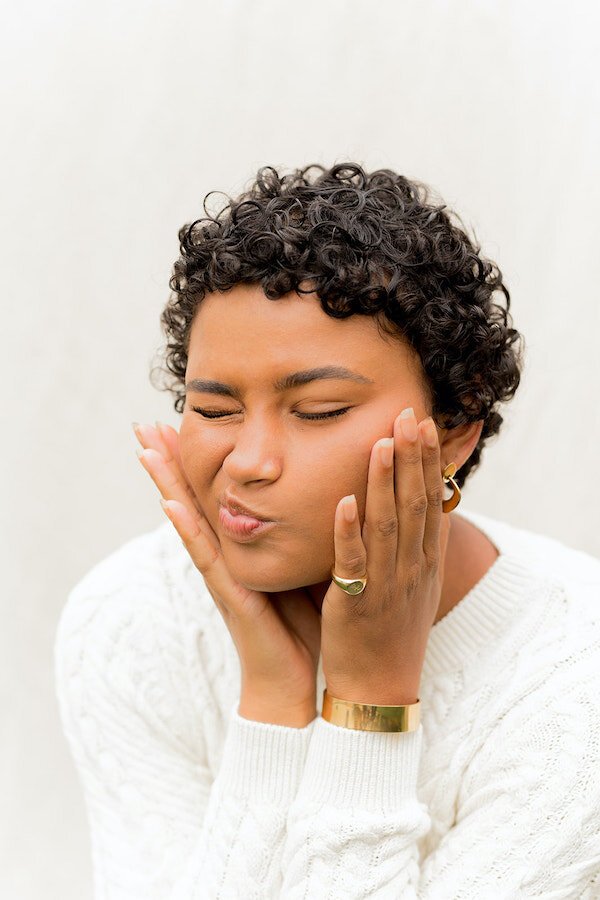
Breaking The Cycle Of Body Shaming As A Mother
There’s a section from Tina Fey’s book “Bossypants” that is sadly familiar to every woman I know:
“One afternoon a girl walked by in a bikini and my cousin Janet scoffed, ‘Look at the hips on her.’ I panicked. What about the hips? Were they too big? Too small? What were my hips? I didn’t know hips could be a problem. I thought there was just fat or skinny. This was how I found out that there are an infinite number of things that can be ‘incorrect’ on a woman’s body.”
“The moment we learn about a beauty standard can forever alter the way we look at our bodies, and become a core memory.”
The moment we learn about a beauty standard can forever alter the way we look at our bodies, and become a core memory. For me, it was thighs, but it could have easily been something else. Every body part comes with its own impossible standard — these standards come in and out of fashion like flare jeans or bucket hats. It’s easy to forget that we’re talking about the flesh-and-bone real bodies we’re born with, bodies that deserve care and kindness, not punishment and shame.
This is a loss of innocence that I dread for my daughter, whose current and only gripe with her body is that she can’t make it fly.
“These relentless expectations for our bodies seem so significant because we usually learn about it from a woman we trust — often our mothers.”
I don’t think I need to detail how I’ve struggled to achieve the ideal beauty standards in my lifetime, or all the ways I’ve given in and been ruled by them, how I’ve conflated my sense of worth with however close I was to the ideal at the time. You’re probably all too familiar with the cycle, passed along from woman to woman since, it seems, the dawn of time. These relentless expectations for our bodies seem so significant because we usually learn about them from a woman we trust — often our mothers. And that’s what makes something like “a thigh gap” go from sounding like a silly thing to a compulsory mandate.
I did not want to stay on this hellish merry-go-round forever, and having my daughter made the stakes suddenly quite high. When I consider how much time, money, and emotion I’ve wasted over hating my body, it feels like a bummer; but when I imagine my child doing the same things, I am struck with instant and visceral heartache.
I started to pay attention to behaviors and language that I was in the habit of using for myself. There was so much that I would never, under any circumstances, want my child to think about her own body. This is ultimately what governs my totally-still-figuring-it-out-as-I-go approach to breaking the body shaming cycle: I imagine my daughter thinking, doing, or saying the same thing about her own precious self. If it makes me sad, I’m no longer allowed to think, do, or say it about me.
Here is a non-exhaustive list of the ways I’m trying to break my body shaming habit so I won’t pass it along to my daughter:
How I talk about myself
- I don’t use moral language for food. There are no “good” or “bad” foods.
- I never punish myself or feel guilty about eating.
- Exercise is a pleasure and a priority for stress management — but never a punishment. I often invite my daughter to join me on walks, for dance parties, and to do yoga.
- If an item of clothing doesn’t fit anymore, I try to frame it around the garment and not the body. For example: “These pants are too small,” instead of “I’m too big for these pants.”
- If I am feeling bloated or full, I talk about the physical sensations rather than the outward appearance.
How I talk about others
- If I compliment a woman’s appearance, I try to choose something she has control over, like how she styled her hair instead of features she was born with and cannot control.
- I am matter-of-fact about differently abled bodies. If my daughter asks about a body difference and I don’t know how to answer, I say something like: “That’s a good question. Let me do some research and we can talk more about it at home.” I always stress that it’s important to remember that everyone is different, and everyone deserves respect and privacy.
- Thinness is not a virtue. I never comment on anyone’s weight loss, let alone congratulate them.
- The only appropriate comment about a pregnant person’s appearance is: “You look great!” But honestly, I generally only talk about how they’re feeling and not what they look like.
How I manage what she says
- I try never to bristle at any comment my daughter makes about my appearance or body. If she calls me old or tells me that my butt is big, I might contextualize the comment for her instead (e.g., “I’m older than you are!” “My butt is bigger than yours!”).
- If she makes an observation that hits a nerve, I take a beat and say, “What makes you say that?” It reminds me that I’m teaching her how to think about and talk about bodies, so I don’t give in to a knee-jerk emotional response.
- If she digs in on a “mean comment,” I remind her that we don’t need to comment about other people’s appearances. “There’s no such thing as a good or bad body,” is the value at the core of what I try to express.
Other general thoughts and practices
- I let my daughter see me naked. I know everyone has different views on this — and as she gets older we will have changing privacy practices — but in a culture where aging women’s bodies are used mostly as a punchline or a horror story, it feels like a powerful opportunity to be comfortable and loving to my own in front of her.
- At 38, I’m noticing things like gray hairs and my skin losing its elasticity. If I comment on it, it’s with wonder or as a factual observation. Aging is a privilege.
- I don’t make a big deal about “getting ready” to be seen in public. Ever. Instead, I treat makeup as a fun thing, like putting on face paint or a party dress. It’s an option, and not one that is necessarily superior.
- I wear bathing suits around her, in public, without cover-ups. If I feel self-conscious, I pretend to be confident until I forget about it. This is surprisingly easy when I’m playing with her instead of posing in a lawn chair.
- I don’t always get everything right, so when I learn new information and decide to change my approach, I try to be honest about that too. I am unlearning a lifetime of habits while trying to instill better ones in her. I give myself as much grace as I can.
The truth is that I can’t control when or how my child will hear that some part of her appearance isn’t meeting a harmful beauty standard. I can only make sure I’m not endorsing it by example. It’s much easier to reject impossible beauty standards if the women you’re closest to are not trying to adhere to them.
“It’s much easier to reject impossible beauty standards if the women you’re closest to are not trying to adhere to them.”
As children, we learn so much by emulation: I hear my daughter mimicking the way I praise our dog, or repeating back to me much less flattering impressions like my exasperated sigh or the way I might sometimes say “I can only do one thing at a time, honey, please be patient.” (This phrase she recently turned back on me when I told her it was time to stop playing and put on her shoes. 🙃) These are reminders that I’m teaching her how to be in the world all the time, how to treat others, and what values we believe in, just by being the most constant and significant example she sees. So how I talk about my body and how I move in it around her matters.
Habits are not harmless, and good habits can be transformative. By holding myself to the standard I want to teach my daughter to hold herself to — a standard of kindness and care — it’s slowly become how I naturally treat myself. I’m not just pretending to be comfortable in my body anymore, I’m actually comfortable. The body shame that I’ve dutifully lugged around for most of my life had become too burdensome. So I put it down. I can only do one thing at a time, after all.
“All I can do is give her a different image, one that I hope will matter: the memory of her mother, laughing and joyful, totally comfortable in her imperfect, wrinkled skin.”
I want her to understand that the beauty standard will shift multiple times over her life, but that her body will be with her through all of it. I want her to resist becoming her own enemy for the sake of something as transient as low-rise jeans. I know she will be bombarded with images trying to convince her otherwise, so all I can do is give her a different image, one that I hope will matter: the memory of her mother, laughing and joyful, totally comfortable in her imperfect, wrinkled skin.
As Tiny Fey says, “If you retain nothing else, always remember the most important rule of beauty, which is: who cares?”
Stephanie H. Fallon is a writer originally from Houston, Texas. She has an MFA from the Jackson Center of Creative Writing at Hollins University. She lives with her family in the Blue Ridge Mountains of Virginia, where she writes about motherhood, artmaking, and work culture. You can find her on Instagram or learn more on her website.




